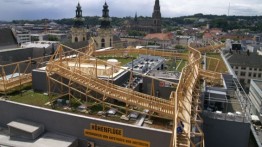ARCHITECTURAL BEHAVIOROLOGY: Yoshiharu Tsukamoto / Atelier Bow-Wow
Wednesday, November 3, 2010, 7 - 9pm

Linz Super Branch; courtesy Atelier Bow-Wow
CURRENT WORK: YOSHIHARU TSUKAMOTO / ATELIER BOW-WOW
“Architectural Behaviorolgy”
Moderated by Anthony Vidler
Yoshiharu Tsukamoto, co-founder of Tokyo-based Atelier Bow-Wow, will explore the concept of “architectural behaviorology” in the firm’s recent and current work. “Behavior,” as defined by Tsukamoto, can include human behavior inside and outside of buildings; physical phenomena produced by different environmental elements such as light, air, heat, wind, and water; and a building’s behavior in its surroundings. “Architectural behaviorology” aims to understand the behaviors of those different elements in order to synthesize them, optimizing their performance in their specific contexts and suggesting a new idea of the “organic” in architecture.
Yoshiharu Tsukamoto co-founded Atelier Bow-Wow in 1992 with his partner Momoyo Kaijima. The practice has designed and built over 20 houses, public museums, and commercial buildings mainly in Tokyo. Pet Architecture Guidebook and Made In Tokyo, published in 2001, were amongst many urban research studies that lead to the experimental project “micro-public-space,” a new concept of public space, which has been exhibited across the world at events such as Biennales in Sao Paolo, Venice, Istanbul, and Liverpool.
The firm’s recent projects include Four Boxes Gallery in Skive, Denmark, Linz Super Branch in Austria, and Rue Rebiere in Paris. Earlier this year, Rizzoli published a monograph on the firm, Behaviorology. Atelier Bow-Wow was featured in the Japanese Pavilion of this year’s Venice Biennale and was recently commissioned by the Guggenheim Museum to design the first BMW Guggenheim Lab, a traveling, movable structure that will be a public space to share ideas and solutions on issues surrounding urban life.
In addition to the practice, Tsukamoto is an associate professor at Tokyo Institute of Technology, and has been a visiting faculty member at the Harvard GSD and UCLA.
Admission is free for League members and The Cooper Union students/faculty/staff, and $15 for non-members.
Located in The Great Hall, in the Foundation Building, 7 East 7th Street, between Third and Fourth Avenues




